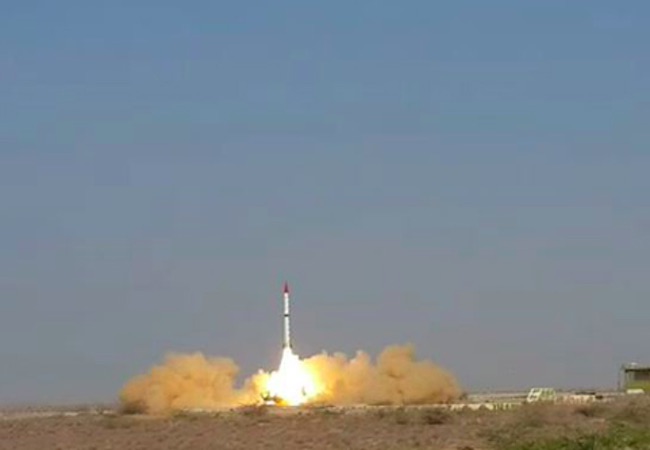
By Adeel Mukhtar Mirza
As Pakistan did not start developing nuclear weapons until India forced Pakistan through its actions, similarly, Pakistan should not sign CTBT unless India do. One must inquire, why? How signing CTBT without waiting for India to sign it, could affect Pakistan’s national security?
CTBT: Comprehensive Test Ban Treaty (CTBT) aimed at eliminating nuclear weapons in the end. As a first step, a ban on further nuclear test was discussed during the ninth session of the United Nations General Assembly (UNGA) in 1954. In 1996, the international community introduced a practical step in the form of CTBT draft.
According to the proponents of the treaty, CTBT will make it harder for any nation to develop advanced nuclear weapons. Universal applicability, if ratified by all, will halt further testing and consequently world will move towards total elimination of nuclear weapons as by agreeing on CTBT, nations will be at better position to enhance their capacity and will to cooperate with each other. At the May 2005 NPT review conference, Ambassador Ronaldo Sardenberg of Brazil said, “Brazil has consistently called for the universalization of the CTBT, which we consider to be an essential element of the disarmament and nonproliferation regime.” In addition, it would also strengthen the norm against their use-Nuclear Taboo. In favour of the United States, the proponents were of the view, at its initial stages especially, that it would enhance the credibility of U.S nuclear deterrence, as it would have allowed it to amplify its lead in nuclear weapons technology owing to overall more number of nuclear tests conducted by U.s in comparison with all other nations. On monitoring and verification difficulties, the ratification of the treaty will help in accumulating data and on-site inspection to investigate suspicious activities, which allows to curb proliferation or weapon development activities. Ratification for CTBT by U.S, resultantly, will result in delegitimizing other states’ concerns of building nukes.
The opponents of the treaty, on the contrary, were hesitant to agree with the arguments that treaty could help eliminate nuclear weapons. According to them, CTBT will not be helpful in halting proliferation activities as nations who want to develop nukes would easily do this by not joining NPT or CTBT or leaving it as North Korea did. Moreover, real-time confidence on the deterrent capability could only come from real time testing. Similarly, although a much progress have been made in the U.S Stockpile Steward Program as in 2002, a U.S. National Academy of Sciences (NAS) panel determined that U.S. warheads could remain safe and reliable without testing if the United States could meet certain conditions, among them maintaining a high-quality workforce, using the Stockpile Stewardship Program (SSP) to examine weapons components, and refurbishing old weapons by remanufacturing them to original specifications but US, until now, is reluctant to move on.
South Asian Case: Strategic balance between South Asian nuclear states, India and Pakistan, is an indispensible prerequisite for peace and stability in South Asia. Owing to the utility of prevailing strategic balance, both states successfully avoided full-scale wars especially since overt nuclearization, however, dangers of asymmetrical arms, both conventional as well as nuclear, acquisition are looming over South Asia.
Some key reasons for this asymmetry are India’s military advancement and modernization under the umbrella of Indo-US nuclear strategic partnership, India’s economic imperatives, India’s proactive military strategies, its conventional superiority and biased policies of the West as far as Fissile Material Cutoff treat (FMCT) and Comprehensive Test Ban Treaty (CTBT) are concerned especially in reference to South Asia.
In this vein, India as the third largest conventional military power is a serious challenge to Pakistan’s national security. Indian defense spending has doubled since 1997, growing at an average rate of 6.3 per cent per year. In 2011-2012, India surpassed China as the biggest importer of the state-of-the art major weapon systems. In addition, Narendra Modi’s government announced 11 per cent increase in 2015-2016 military budget that becomes $39.8 billion. Similarly, Indian Army and Air force has advantage of 2:1 and 1.9:1 ratio over Pakistan forces respectively, according to, “The Military Balance 2015,” of International Institute of Strategic Studies (IISS). In addition, Indo-US nuclear deal helps India engage in rapid development of strategic/nuclear military power and threatens deterrence equilibrium and strategic stability as, “contrary to the claims of its advocates, the deal [Nuclear] fails to bring India further in conformity with the nonproliferation behavior expected of the member states of the nuclear Nonproliferation Treaty (NPT). Unlike other countries, India has not signed the Comprehensive Test Ban Treaty (CTBT). It continues to produce fissile material and expand its arsenals,” Ambassador (R) Jayantha Dhanapala and Daryl G. Kimball argues.
More recently, India successfully launched an upgraded version of the interceptor missile against an electronically simulated target missile over the Bay of Bengal. The Hindu further claimed that the conditions similar to the launch of a target missile from the Indian city of Balasore were electronically simulated and upon receiving its coordinates, the interceptor missile, travelling at a supersonic speed, engaged and reportedly destroyed the ‘virtual target’ in mid-flight.
In Sum, India has conventional superiority. She has economic superiority. She too has Prahaar, a tactical nuclear weapon. She is developing ABM system. And, now India also has computer simulation technology for testing purposes. India could also test a thermo nuclear device in future and sign CTBT, which would leave Pakistan no choice other than being blackmailed if it signs the treaty before India.
Pakistan, in this sense, is left with no other choice than not to sign CTBT, improving its defence capabilities and more importantly, it should advance in technology. There is no other way around if preserving of Pakistan’s national security in the ultimate aim.




